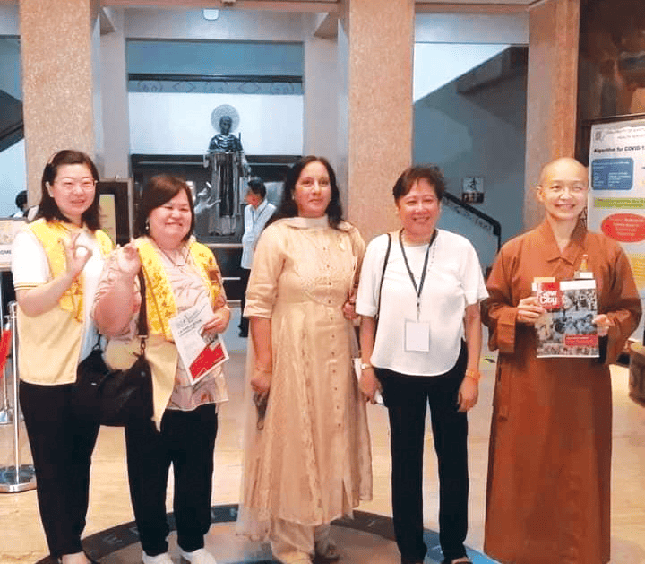
Chiara: Apostle of Dialogue. This was the title that appeared in huge letters on the stage backdrop for a special event at the Pontifical and Royal University of Santo Tomas (UST), in Manila on March 12, 2023. Twenty-five years ago, this educational institution conferred on Chiara Lubich, foundress of the Focolare Movement, an honorary doctorate in Sacred Theology. It was the first time that such an honor was awarded to a layperson and a woman.
The title of the commemoration was inspired by the message that Pope John Paul II sent to Chiara herself in 2003. The occasion was the 60th anniversary of the birth of the Focolare Movement. The Pope wrote: “In unison with the Magisterium of the Church … the members of the Focolare Movement have become apostles of dialogue, the privileged way to promote unity: dialogue within the Church, ecumenical and interreligious dialogue, and dialogue with non-believers.”
Indeed, unity was Chiara’s dream, the motto of her life, and the charism that the Holy Spirit bestowed on her. This is also the specific aim of the Focolare Movement. In the words of Very Rev. Fr. Richard G. Ang, O.P., Rector Magnificus of the University of Santo Tomas, the charism of unity “draws together people of all cultures, races, religions, and ages.” For this reason, he continued, “the Focolare Movement imbibes what Pope Francis calls a ‘culture of encounter,’ promoting a culture of dialogue, of religious experiences and action.”
Dialogue, for Chiara, “is not simply a human initiative,” emphasized Margaret Karram, current President of the Focolare Movement, when she greeted those gathered for the commemoration. It is “a gift from God,” founded on Jesus’ prayer for unity: “that they may all be one” (Jn 17:21). This can be translated into “Make the whole of humankind one family,” added Cherylanne Menezes and Andrew Camilleri, co-delegates of the Indian Subcontinent-Philippines zone. Chiara has invited millions and continues to invite people all over the world to seriously live reciprocity in relationships so that this dream of unity may be achieved.
Dialogue has always been a privileged practice of the Focolare Movement. Indeed, its long tradition of ecumenical and interreligious dialogue is evident just by looking at the participants in the UST event. Together with the Holy Father’s representative, Apostolic Nuncio to the Philippines, Archbishop Charles Brown, and 5 Catholic bishops, were 2 bishops of the Greek Orthodox Church in the Philippines, 2 bishops of the Iglesia Filipina Independiente (also known as Aglipayan Church), one from the Iglesia Unida Ecumenical, and another from the United Church of Christ in the Philippines, with 27 representatives from various other Churches. There were also 15 guests from different religions, among whom were Muslim, Hindu and Buddhist personalities.
They are a living reminder of the incredible relationship that Chiara Lubich had established with personalities of the ecumenical world of her time. Her visits to Patriarch Athenagoras of the Greek Orthodox Church, in the Phanar, in Istanbul, were a witness of her love for the Orthodox Church which was amazingly reciprocated. Shortly before Chiara passed away, the Patriarch’s present successor, Bartholomew I, went to see her at her residence in Rocca di Papa near Rome (Italy). Chiara’s relationship with the World Council of Churches dates back to the time of the Second Vatican Council and continued until the visit to the Focolare headquarters of Rev. Samuel Kobia, the Council’s Secretary General, in January 2008. On her death, he paid tribute, saying: “Our love for Chiara and immense gratitude for the gift of God she has been to the ecumenical movement, will continue to motivate and inspire us in our work for the visible unity of the Church.”
From a video presentation shown during the celebration in UST, it was beyond doubt that Chiara also felt a special bond with those who profess other religious beliefs. She had developed profound friendships with Buddhists in Japan and in Thailand, with African-American Muslims in Harlem, New York (USA), with Jews in Argentina, and with Hindus in India. She was convinced that followers of all religions are bound together by the Golden Rule. “It is found in the Gospel, but also in almost all sacred texts of other religions,” she affirmed.
From India, Dr. Kezevino “Vinu” Aram, Director of Shanti Ashram and Founder of the International Center for Child and Public Health in Coimbatore (India), sent a moving video message for the occasion. She met Chiara in 2001 when she was a young woman. At that time, Chiara received the Defender of Peace Prize from two prestigious Hindu-Gandhian institutions: the Shanti Ashram and the Sarvodaya Movement. The day after the awarding ceremony, Chiara visited Shanti Ashram where she was welcomed by Vinu and her mother Minoti.
In her message, Dr. Aram outlined what she considers are the dimensions of Chiara’s gift to the world. First is “the prophetic voice of a 19-year-old, at a time when the world was not used to listening to a young person, and definitely, not to the voice of a woman.” She regards Chiara as a “forerunner in the image of leadership grounded in the values of faith.”
Second is the universal dimension of her life and her work. She described Chiara as one who went deeper into her faith but was also open to the richness and bounty of the world. “Dialogue with other cultures and religious life was (for her) a way to live this universal dimension of love,” stated Dr. Aram.
Third is the power of dialogue. This dimension does not always want “to arrive at the destination but (wants) to be able to speak, to be able to share, to be able to feel the oneness which is rooted in mutual respect.”
She closed her message with a notable quote from Mahatma Gandhi: “What we do today will determine our tomorrow.” With this, she wished everyone would continue being apostles of dialogue.
Nilda M. Castro




